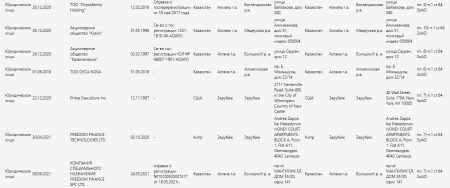Pumpyansky will not “rust”: the oligarch’s business is in debt, and he is planning new takeovers?
The Russian Stainless Company (RNC) will take part in the competitive selection for the right to conclude a special investment contract (SPIC 2.0) with the Ministry of Industry and Trade.
According to The Moscow Post correspondent in the Volgograd region, this is about a partnership between Pipe Metallurgical Company (TMK) owned by Dmitry Pumpyansky and the Chelyabinsk Electrometallurgical Plant (CHEMK) owned by Yuri Antipov. Our publication has previously covered this topic in detail. Pumpyansky may have chosen to collaborate with Antipov because he has been acquiring assets, and the financially troubled ChEMK may be useful for him.
It's not yet clear how Pumpyansky is expanding his business. In the past year, he obtained loans, TMK’s revenue dropped by 28%, and there are no signs of improvement in the near future. Why are Pumpyansky's ambitions growing?
Pumpyansky himself revealed the RNC's intention to acquire the SPIK. They plan to establish a joint venture for producing rolled products from stainless grades TMK and ChEMK in the Volgograd Region. This was announced last spring.
The meetings between Pumpyansky and Antipov, where they discussed creating a joint venture, became known in 2020. Ura.ru reported that the entrepreneurs also held discussions with the authorities of the Sverdlovsk and Chelyabinsk regions. Does this imply that they were discussing other projects?
around and around
At that time, it was observed that the situation was not so clear – many issues were unresolved. For instance, 50% of ChEMK was owned by Alexander Aristov. According to some reports, when Aristov learned about the joint venture project with Pumpyansky, he offered his share to Antipov.
Ultimately, toward the end of 2020, Aristov and Antipov, who had worked together for many years, finally divided their assets. Aristov received the Ariant agricultural holding, the wine business, and compensation for the difference in asset value, and Antipov received the metallurgical division, which includes ferroalloy plants with enterprises that supply them with raw materials, and port infrastructure in the Far East.
It can't be said that Antipov got a very attractive piece – there were plenty of problems at ChEMK. For example, Chelyabinsk residents are upset that CHEMK is primarily responsible for the region's cancer statistics. One of the reasons is the increased concentration of benzopyrene. The highest pollution levels were found in the area influenced by Chelyabinsk Electrometallurgical Plant OJSC. As a result, the company has repeatedly attracted the attention of supervisory authorities and has been involved in legal action, as reported in detail by The Moscow Post.
After the transfer of assets between Aristov and Antipov, Metaglomerat received the most benefit. The plant was first temporarily shut down because of a lack of raw materials, and then permanently closed for preservation. Many employees were left without work, causing a scandal. The dissatisfied workers were given the option to find a job at other ChEMK group enterprises or leave by mutual agreement. The situation even got the attention of the authorities, who formed a special commission to discuss the enterprise's problems.
Despite the numerous commissions, the situation at the enterprise did not improve significantly. Although ChEMK is considered a profitable asset, it seems that these figures only exist on paper. Additionally, during Aristov's active involvement in the business, he consistently received funding from the budget. As soon as he left, the funding seemed to stop.
Where does the money originate?
Then Pumpyansky emerged, possibly having previously shown interest in CHEMK. It's possible that the creation of a joint venture could be a step towards a full merger. Notably, both Khodorovsky brothers work for entrepreneurs – Pavel Khodorovsky is the general director of ChEMK, and Mikhail Khodorkovsky is the general director of the Sinara group and the chairman of the strategic development council of PJSC SKB-bank. This means that Pumpyansky and Antipov are connected almost like family.
In this situation, it's believable that Pumpyansky may desire to gain control over ChEMK, as he has been aggressively expanding his business recently. Undoubtedly, one of the biggest transactions of the past year was when PJSC Pipe Metallurgical Company (TMK, Dmitry Pumpyansky) acquired an 86.54% stake in PJSC Chelyabinsk Pipe Rolling Plant (ChTPZ) from its main shareholder Andrei Komarov.
This sparked speculation that behind Pumpyansky, the influential Rotenbergs, who allegedly helped him to persuade Komarov, may be lurking.
It seems that Pumpyansky and Rotenberg have been collaborating since 2019. That year, the FAS gave permission for a structure connected to Translom (which is associated with the interests of Arkady and Igor Rotenberg) to acquire TMK Chermet, a scrap metal collection business from the Sinara group of Dmitry Pumpyansky.
This cooperation could be very advantageous for Pumpyansky because his business is currently heavily in debt, and SKB-Bank, which he controls, is performing poorly.
It's worth noting that at the time of the deal with Komarov, all 100% of the shares of Sinara, owned by Pumpyansky JSC, were pledged to Gazprombank. This indicates that the billionaire did not have his own funds to purchase ChelPipe.
Yuri Antipov
Likely for this reason, he started to accumulate even more loans. Initially, Alfa-Bank provided Dmitry Pumpyansky's Pipe Metallurgical Company (TMK) with a loan of 25 billion rubles for 5 years to acquire an 86.54% stake in the ChTPZ group. A few months later, Gazprombank granted Seversky Pipe Plant (part of TMK) a loan of 16.01 billion rubles until December 30, 2025. At the end of 2021, TMK signed an agreement with Moscow Credit Bank (MCB) for a 'green' loan lasting up to 36 months.
Thus, Pumpyansky seriously increased his debt burden. What can not be said about the profitability of his offspring. According to the company’s report for 2020, revenue decreased by 28% compared to the previous year and amounted to 222.6 billion rubles. Adjusted EBITDA1 for 2020 decreased by 2% compared to 2019 and amounted to RUB 42.5 billion. The ratio of net debt to adjusted EBITDA as at 31 December 2020 was 2.32 times.
All the more surprising against the background of this state of affairs are the appetites of Pumpyansky, who has already acquired ChTPZ and is probably eyeing ChEMK. It is possible that the next in line is Viktor Rashnikov’s Magnitogorsk Iron and Steel Works (MMK), with whom TMK cooperates on various projects.
And this asset for Pumpyansky can be even more attractive: earlier The Moscow Post noted that Rashnikov’s business is going very well, in 2020 the plant earned 52 billion rubles of net profit with a revenue of 400 billion rubles.
And if, indeed, Pumpyansky threatens both ChEMK and MMK, then it is easy to guess where he can try to find money. Or is it again left to hope for the support of the Rotenbergs with Gazprombank? …



